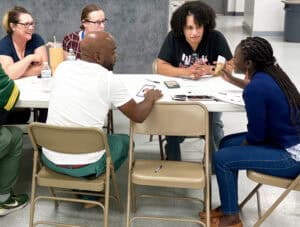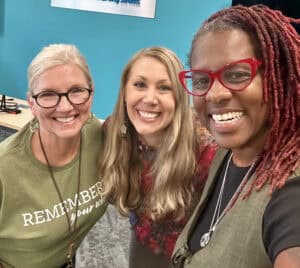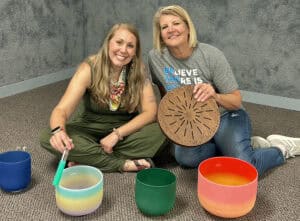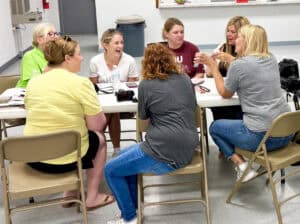Finding the Sacred, Rediscovering the Center: CHHSM Workshop and Retreat Help Equip Hoyleton Staff

Hoyleton Youth & Family Services, based in Fairview Heights, Ill., has a 130-year commitment to social justice. But recent events around the country and the world have heightened that commitment. As a CHHSM agency, Hoyleton approaches justice through a faith-based lens. So when executive staff members began creating and implementing a three-year holisitic leadership development program to expand Hoyleton’s leadership capacity and improve workplace culture, they turned to consultants, including CHHSM, for help.
In response, CHHSM’s the Rev. Dr. Elyse Berry, associate for advocacy and leadership development, worked with Hoyleton staff to develop a year-long plan that included two Nollau To You workshops for staff in leadership roles. The first, held in April, focused on Hoyleton’s connection with CHHSM and spiritually-grounded programming strategies. The second, held Sept. 10 and 11, 2025, built off the April workshops and expanded to organizational themes around restorative justice and healing/resilience practices. Additionally, Hoyleton asked Berry to run its Sept. 13 staff retreat, “Grounding in Nature.”
Participants in the workshops and the retreat found the experiences healing and worthwhile. “The two [workshop] experiences presented a whole related to how we support one another,” said Jennifer Cox, Hoyleton’s director of learning and staff development, “first, learning about ourselves and collective experiences, and then learning about the healing aspect. It is difficult to fully support others if you don’t first look inward. I think this culminated at the staff retreat when we focused on being part of something bigger.”

The restorative justice workshop sessions were led by Berry and the Rev. Dr. Zaria Davis, CHHSM’s associate for membership and engagement. The workshop was offered three times to different groups of staff membrs. Each session was broken down into an opening ritual and group reflection exercise, discussion about restorative justice in the workplace, healing when called to heal, and a closing ritual and visioning. The intent was to leave viable practices with staff to assist them in their daily work and personal lives.
The restorative justice section included a case study scenario. “The staff was able to make a connection to their everyday work,” said Davis. “I appreciated the team members investing their own development and leadership during our time together. I believe that they learned skills they may utilize and embed in their work.”
The workshops intentionally included a restorative healing practice — healing circles — following the restorative justice discussion and activities.
“In the healing circles, participants were invited to share a word or phrase of how they entered the space and then how the felt leaving the circle at the end,” said Berry. “One person said she went from feeling skeptical and isolated to feeling connected and supported, which I think speaks to this practice’s impact.”
For Chris Cox, president and CEO of Hoyleton, the topic of the second workshop was essential, as staff members continue to struggle in the wake of the death of Michael Brown in 2014. Some Hoyleton staff members live in or have family in Ferguson, Mo., where Brown was killed. “It was a profound time for us at Hoyleton,” said Cox, “and showed everyone what injustice really means. We are [still] living in really difficult times with heated emotions.”

Cox cited the frank discussions and the healing circles as particularly helpful for his staff, particularly in defusing microaggressions. Microaggressions are subtle, often unintentional comments and actions that communicate bias or prejudice toward someone, impacting their psychological well-being and creating inequities. Their cumulative effect can be significant, leading to decreased trust, avoidance of care, and an overall negative impact on an individual’s quality of life.
“Microaggressions happen every day in the workplace,” said Cox. “Often, they’re not dealt with and so they can fester and can become a larger issue. Restorative justice practices can help us deal with that.”
The cumulative effect of the two workshops was felt from all participants. “As our leaders were connected through the whole experience of the Nollau To You workshops, I heard many comments of staff feeling renewed in our mission and our ‘why,’” said Julie Neuner, Hoyleton’s chief program officer.
The Sept. 13 staff retreat, offered by Berry, provided closure plus a respite from the normal day-to-day stresses. Held in a nearby park, the retreat wove themes of nature and ancient stories about the stars into a sense of grounding. It was intended to “offer a more inclusive experience and understanding of spirituality” while keeping Hoyleton’s foundation in faith-based mission as they welcome staff members from diverse backgrounds and beliefs, she said.

The retreat was one of two opportunities Hoyleton staff has each year to come together to “celebrate what faith means in our work,” Cox said. “We pride ourselves that our work is faith based, and we try to emulate that with our clients.”
“The retreat was a chance to take dedicated time to lift up our faith-based heritage and examine how we can broaden that,” he added. “The retreat brought together staff that usually don’t have the opportunity to share together because they work in different locations. It gave us a chance to come together and talk about how each serves the least among us.”
Following an opening grounding ritual and community building activity, Berry introduced the concept of nature with a sound bath “by playing crystal singing bowls while folks had time to simply be in nature,” she said.
When they returned to the meeting room, “we went from a focus on the earth in the beginning to the sky and stars to close out the day,” Berry said. “I used discussion cards from different phases of the moon for folks to write, reflect, and share what the card brought up for them. One group noted how everyone at their table was in a different phase of their life as a parent: one was a new mother, another had a child in school, and another had her grown children graduate from college.”

Berry closed the session by introducing how similar mythological origin stories exist behind the Pleiades and Orion constellations. Recent research posits that these stories may be the oldest in human history, reaching back 100,000 years. The discussion served as a springboard for participants to create constellations of their role and work at Hoyleton, using a variety of materials “for the art lover and craft avoider alike,” said Berry.
“Your work is part of something much larger than you, than all of us,” Berry told participants. “Your work of caring and justice is more ancient than we can even understand. You are part of such a legacy. You are part of something timeless and long-lasting. Your work is sacred. Let us honor that fact.”
Neuner’s takeaway from the retreat was found in that timelessness. “We all are connected through a higher purpose and have a responsibility to create a just, caring, and compassionate world for our clients and our staff,” she said. “Our work and journey may look different depending on our role, but staying connected to a greater purpose keeps us grounded and focused on our mission.”

At Hoyleton, “we feel like we are right in the middle of the social issues going on,” said Cox. The retreats become “sacred space for us.”
That sacred space extends to Hoyleton’s day-to-day work, particularly with Hoyleton’s Puentes de Esperanza program, which builds bridges and offers resources to the local Latinx community. Currently, both Hoyleton staff members and their clients are personally impacted by the sudden seizing of family members and friends off the streets by ICE agents.
“There are no more emotional-laden conversations I’ve ever had than right now,” said Cox, who has been doing outreach work for 36 years. The retreat allowed “75-80 folks to let all the day-to-day concerns go and focus on the uniqueness of each individual, and what they’re doing to make their community better. It brought tears to my eyes.”
“The retreat was very rejuvenating,” said Jennifer Cox. “Focusing on being part of something larger and having a common ‘story’ helps unite us while respecting our individual beliefs. Time to connect in nature and just ‘be’ in the moment was a nice change from our typical work pace.”
“Our jobs are heavy at times,” she added, “and taking time to reflect, enjoy, and share fellowship helps everyone recognize both the beauty of what we do and that we are truly together in this work and mission.”

Andrea Nafziger, director of marketing and communications, concurred. “Our team enjoyed a beautiful morning together, connecting, reflecting, and practicing self-care,” she said.
For Cox, the impact of the retreat was simple. “I left there — and many of my staff did, too — thinking, ‘There couldn’t have been a better place for me to spend the last three hours.’”
Cox highlighted the impact that being part of CHHSM has on Hoyleton. “Leveraging the tools that CHHSM has — the resources, expertise, and knowledge — and applying that in our local ministries has always been the benefit for me,” he said. “CHHSM is an extension of my staff team. CHHSM is a trusted resource. These [workshops and retreats] are always sacred conversations by the very nature of the topics, and CHHSM is well equipped to lean into that space.”
Hoyleton “will continue to work with CHHSM” on developing processes for building capacity and having resources in its system when there’s an opportunity for restorative justice practices, he added. “This is important work.”
Cox also reflected on the wider family of CHHSM organizations and agencies. “Our communities are going to need us more than ever,” he said, “and it is going to be in more ways than we can imagine. There is so much unrest. The unrest and the pitting us against each other are going to come back and people will look to the faith-based organizations. It’s our moment to make a real difference.
“I encourage all my faith-based partners to explore the resources and opportunities that CHHSM can help them with in their communities. It will help them and their teams in their journey.”
Join Our Mailing LIst
"*" indicates required fields
Follow on Facebook
Advocate Health Names New Chief Marketing, Brand and Consumer Experience Officer - CHHSM
www.chhsm.org
Advocate Health has named Nicole Phillips as a senior vice president and the new chief marketing, brand and consumer officer for the nation’s third-largest nonprofit health care provider. Phillips w...